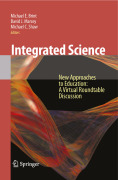
Integrated science: new approaches to education a virtual roundtable discussion
Shaw, M.C.
Brint, M.E.
Marcey, D.
Across science and engineering, new opportunities are unfolding at the convergence of traditional fields. To meet the demands for students with interdisciplinary education, new undergraduate curricula have emerged. Biomedical engineering, for example, builds upon foundations in biology, physics, chemistry and materials science coupled with engineering design principles. In building successful interdisciplinary science programs, however, many questions must be addressed. Although many resources exist for developing and implementing new academic programs, there does not exist in a single volume that adequately addressthis important topic. Integrated Science: New Approaches to Education is a focused collection of essays addressing the myriad challenges associated with conceptualizing, developing, implementing and measuring the success of new undergraduate programs in interdisciplinary science and engineering fields. This book will provide an overview of this process drawn from a broad perspective of experts. Will discuss new approaches to graduate training in the sciences including the decline of both the large laboratory and the usefulness of traditional Ph.D. program Covers the politics, sociology and economics of integrated science with essays offering contending perspectives on interdisciplinary science education as well as focused discussions of issues of diversity and economicanalysis INDICE: Introduction: M.E. Brint and M.C. Shaw. Building 21st Century Global Communities Of Practice In Science And Education: Bruce Alberts. Promoting Quality and Creativity in Faculty and Students: David Baltimore. Education in Response to the New Biology: Henry Riggs. Post-Graduate Education: Lee Shulman. Science Education and the Practical Arts: Freeman Dyson. Integrating the Sciences: Paul Grobstein. Fragmented Disciplines and the Integration of Sciences:Andrew Abbott. Scientific Disciplines in Relation to Issues of Diversity: Susan Hill. The Economics of Scientific Research and Discovery: Thomas Bliss. TheFive Fastest Growing Scientific Areas And The Education Needed To Fill Them: Karen M. Czarnecki. Biotechnology—Bill Tawil, Baxter Healthcare and Mike Shaw.Molecular Biology and Biochemistry—David Marcey. Nanotechnology—Carlo Montemagno. Brain Science—Steven Pinker. Bioinformatics—Chris Sanders.
- ISBN: 978-0-387-84852-5
- Editorial: Springer
- Encuadernacion: Rústica
- Páginas: 300
- Fecha Publicación: 01/12/2008
- Nº Volúmenes: 1
- Idioma: Inglés
